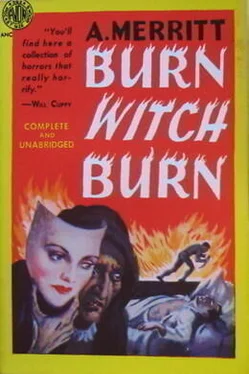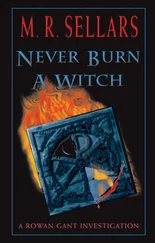He studied me in silence for a little, then nodded.
"Now I understand. It's hit you pretty hard, too, hasn't it? You're doing a little beating of your own against the mirror, aren't you? Well, I've had a struggle to thrust aside what I've been taught is reality and to admit there may be something else just as real. This matter, Lowell, is extra–medical, outside the science we know. Until we admit that, we'll get nowhere. There are still two points I'd like to take up. Peters and the Darnley woman died the same kind of death. Ricori finds that they both had dealings with a Madame Mandilip—or so we can assume. He visits her and narrowly escapes death. Harriet visits her, and dies as Darnley and Peters did. Reasonably, therefore, doesn't all this point to Madame Mandilip as a possible source of the evil that overtook all four?"
"Certainly," I answered.
"Then it must follow that there could have been real cause for the fear and forebodings of Harriet. That there could exist a cause other than emotionalism and too much imagination—even though Harriet were unaware of these circumstances."
Too late I realized the dilemma into which my admission had put me, but I could answer only in the affirmative.
"The second point is her loss of all desire to return to the doll– maker after the teapot incident. Did that strike you as curious?"
"No. If she were emotionally unstable, the shock would automatically set itself up as an inhibition, a subconscious barrier. Unless they are masochists, such types do not like to return to the scene of an unpleasant experience."
"Did you notice her remark that after the scalding, the woman did not accompany her to the door of the store? And that it was the first time she had neglected to do so?"
"Not particularly. Why?"
"This. If the application of the salve constituted the final act, and thereafter death became inevitable, it might be highly embarrassing to Madame Mandilip to have her victim going in and out of her shop during the time it took the poison to kill. The seizure might even take place there, and lead to dangerous questions. The clever thing, therefore, would be to cause the unsuspecting sacrifice to lose all interest in her; indeed, feel a repulsion against her, or even perhaps forget her. This could be easily accomplished by post–hypnotic suggestion. And Madame Mandilip had every opportunity for it. Would this not explain Harriet's distaste as logically as imagination—or emotionalism?"
"Yes," I admitted.
"And so," he said, "we have the woman's failure to go to the door with Harriet that day explained. Her plot has succeeded. It is all over. And she has planted her suggestion. No need now for any further contact with Harriet. She lets her go, unaccompanied. Significant symbolism of finality!"
He sat thinking.
"No need to meet Harriet again," he half–whispered, "till after death!"
I said, startled: "What do you mean by that?"
"Never mind," he answered.
He crossed to the charred spot upon the floor and picked up the heat–blasted crystals. They were about twice the size of olive pits and apparently of some composite. He walked to the table and looked down upon the grotesque figure with its skeleton ribs.
"Suppose the heat melted it?" he asked, and reached over to lift the skeleton. It held fast, and he gave it a sharp tug. There was a shrill twanging sound, and he dropped it with a startled oath. The thing fell to the floor. It writhed, the single wire of which it was made uncoiling.
Uncoiling, it glided over the floor like a serpent and came to rest, quivering.
We looked from it to the table.
The substance that had resembled a sprawling, flattened, headless body was gone. In its place was a film of fine gray dust which swirled and eddied for a moment in some unfelt draft—and then, too, was gone.
Chapter X
Nurse's Cap and Witch's Ladder
"She knows how to get rid of the evidence!"
Braile laughed—but there was no mirth in his laughter. I said nothing. It was the same thought I had held of McCann when the doll's head had vanished. But McCann could not be suspected of this. Evading any further discussion of the matter, we went to the Annex to see Ricori.
There were two new guards on watch at his door. They arose politely and spoke to us pleasantly. We entered softly. Ricori had slipped out of the drug into a natural sleep. He was breathing easily, peacefully, in deep and healing slumber.
His room was a quiet one at the rear, overlooking a little enclosed garden. Both my houses are old–fashioned, dating back to a more peaceful New York; sturdy vines of Virginia creepers climb up them both at front and back. I cautioned the nurse to maintain utmost quiet, arranging her light so that it would cast only the slightest gleam upon Ricori. Going out, I similarly cautioned the guards, telling them that their chief's speedy recovery might depend upon silence.
It was now after six. I asked Braile to stay for dinner, and afterward to drop in on my patients at the hospital and to call me up if he thought it worthwhile. I wanted to stay at home and await Ricori's awakening, should it occur.
We had almost finished dinner when the telephone rang. Braile answered.
"McCann," he said. I went to the instrument.
"Hello, McCann. This is Dr. Lowell."
"How's the boss?"
"Better, I'm expecting him to awaken any moment and to be able to talk," I answered, and listened intently to catch whatever reaction he might betray to this news.
"That's great, Doc!" I could detect nothing but deepest satisfaction in his tones. "Listen, Doc, I seen Mollie an' I got some news. Dropped round on her right after I left you. Found Gilmore— that's her husband—home, an' that gave me a break. Said I'd come in to ask her how she'd like a little ride. She was tickled an' we left Gil home with the kid—"
"Does she know of Peters' death?" I interrupted.
"Nope. An' I didn't tell her. Now listen. I told you Horty—What? Why Missus Darnley, Jim Wilson's gal. Yeah. Let me talk, will you? I told you Horty was nuts on Mollie's kid. Early last month Horty comes in with a swell doll for the kid. Also she's nursing a sore hand she says she gets at the same place she got the doll. The woman she gets the doll from gave it to her, she tells Mollie—What? No, gave her the doll, not the hand. Say, Doc, ain't I speaking clear? Yeah, she gets her hand hurt where she got the doll. That's what I said. The woman fixes it up for her. She gives her the doll for nothing, Horty tells Mollie, because she thought Horty was so pretty an' for posing for her. Yeah, posing for her, making a statue of her or something. That makes a hit with Horty because she don't hate herself an' she thinks this doll woman a lallapaloozer. Yeah, a lallapaloozer, a corker! Yeah.
"About a week later Tom—that's Peters—shows up while Horty's there an' sees the doll. Tom's a mite jealous of Horty with the kid an' asks her where she got it. She tells him a Madame Mandilip, an' where, an' Tom he says as this is a gal–doll she needs company, so he'll go an' get a boy–doll. About a week after this Tom turns up with a boy–doll the lick–an'–split of Horty's. Mollie asks him if he pays as much for it as Horty. They ain't told him about Horty not paying nothing for it or posing. Mollie says Tom looks sort of sheepish but all he says is, well, he ain't gone broke on it. She's going to kid him by asking if the doll woman thinks he's so pretty she wants him to pose, but the kid sets up a whoop about the boy–doll an' she forgets it. Tom don't show up again till about the first of this month. He's got a bandage on his hand an' Mollie, kidding, asks him if he got it where he got the doll. He looks surprised an' says 'yes, but how the hell did you know that?' Yeah–yeah, that's what she says he told her. What's that? Did the Mandilip woman bandage it for him? How the hell— I don't know. I guess so, maybe. Mollie didn't say an' I didn't ask. Listen, Doc, I told you Mollie's no dummy. What I'm telling you took me two hours to get. Talking 'bout this, talking 'bout that an' coming back casual like to what I'm trying to find out. I'm afraid to ask too many questions. What? Oh, that's all right, Doc. No offense. Yeah, I think it pretty funny myself. But like I'm telling you I'm afraid to go too far. Mollie's too wise.
Читать дальше










